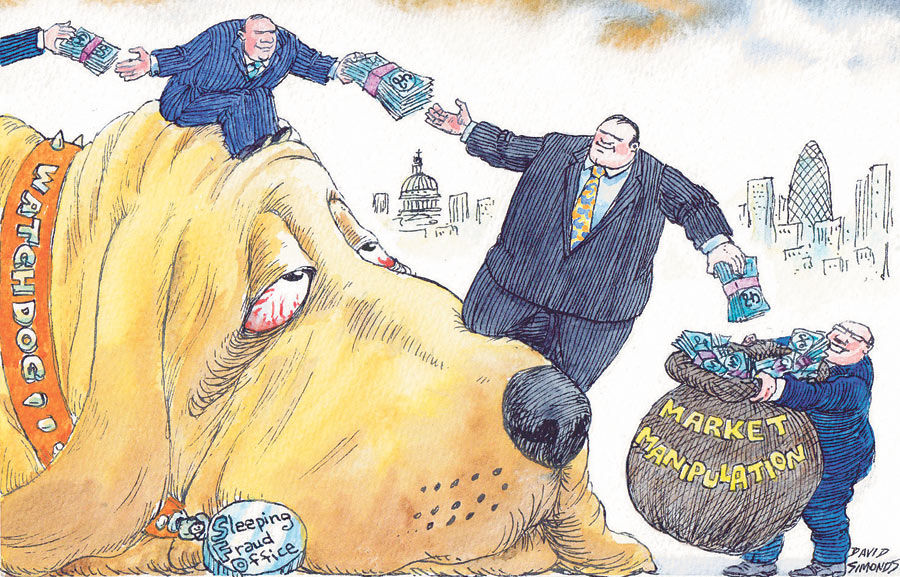"Suspicious Cartel Agreements that Include Derivatives"
The Bank of England said recently that Libor is not the only market which is manipulated by the big banks. We noted last month:There have also been allegations that the self-certifying derivatives indicator – iSwap – has been massively manipulated. See this and this.

Spiegel reports today:
"In our investigations, we concentrate on suspicious cartel agreements that include derivatives. This includes possible secret agreements about the determination of these lending rates," says European Competition Commissioner Joaquín Almunia. In other words, the investigators are interested in more than the manipulation of global interest rates to benefit specific parties. It's also possible that the enormous market for derivatives was manipulated.Of course, out-of-control derivatives were largely responsible for the 2008 financial crisis ... and still pose a massive threat to the economy.
"Derivatives traders are also believed to have agreed upon the difference between the buy and sell prices (spreads) of derivatives, thereby selling these financial instruments to customers under conditions that were not customary in the market," says the Swiss Competition Commission, which is also investigating possible cartels.
It is difficult to find clear evidence, such as a written cartel agreement. But in Brussels alone, more than 40 banks have contacted authorities to report what they know about years of manipulation.
But the cartel of giant banks is preventing a fix:
The big banks are preventing derivatives from being tamed.
***
The derivatives “reform” legislation previously passed has probably actually weakened existing regulations, and the legislation was “probably written by JP Morgan and Goldman Sachs“.
***
Harold Bradley – who oversees almost $2 billion in assets as chief investment officer at the Kauffman Foundation – told the Reuters Global Exchanges and Trading Summit in New York that a cabal is preventing swap derivatives from being forced onto clearing exchanges:
There is no incentive from the moneyed interests in either Washington or New York to change it…I believe we are in a cabal. There are five or six players only who are engaged and dominant in this marketplace and apparently they own the regulatory apparatus. Everybody is afraid to regulate them.That’s bad enough.
But Bob Litan of the Brookings Institute wrote a paper (here’s a summary) showing that – even if real derivatives legislation is ever passed – the 5 big derivatives players will still prevent any real change. James Kwak notes that Litan is no radical, but has previously written in defense in financial “innovation”.
Here’s a good summary from Rortybomb, showing that this is yet another reason to break up the too big to fails:
Litan is worried about the “Dealer’s Club” of the major derivatives players. I particularly like this paper as the best introduction to the current oligarchy that takes place in the very profitable over-the-counter derivatives trading market and credit default swap market. [Litton says]:
I have written this essay primarily to call attention to the main impediments to meaningful reform: the private actors who now control the trading of derivatives and all key elements of the infrastructure of derivatives trading, the major dealer banks. The importance of this “Derivatives Dealers’ Club” cannot be overstated. All end-users who want derivatives products, CDS in particular, must transact with dealer banks…I will argue that the major dealer banks have strong financial incentives and the ability to delay or impede changes from the status quo — even if the legislative reforms that are now being widely discussed are adopted— that would make the CDS and eventually other derivatives markets safer and more transparent for all concerned…Here, of course, I refer to the major derivatives dealers – the top 5 dealer-banks that control virtually all of the dealer-to-dealer trades in CDS, together with a few others that participate with the top 5 in other institutions important to the derivatives market. Collectively, these institutions have the ability and incentive, if not counteracted by policy intervention, to delay, distort or impede clearing, exchange trading and transparency…
Market-makers make the most profit, however, as long as they can operate as much in the dark as is possible – so that customers don’t know the true going prices, only the dealers do. This opacity allows the dealers to keep spreads high…
Finish reading>> Zero Hedge